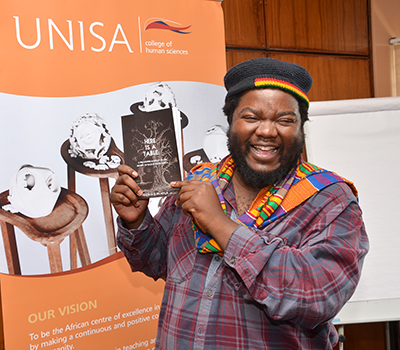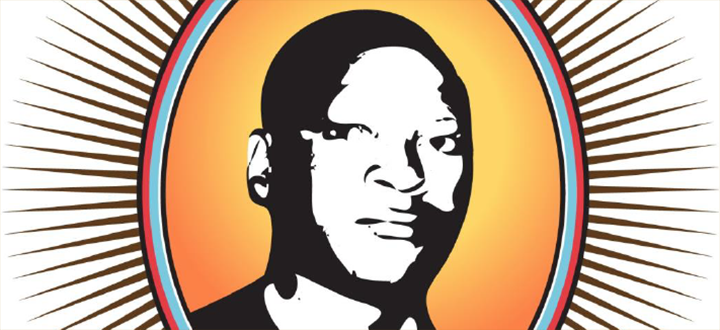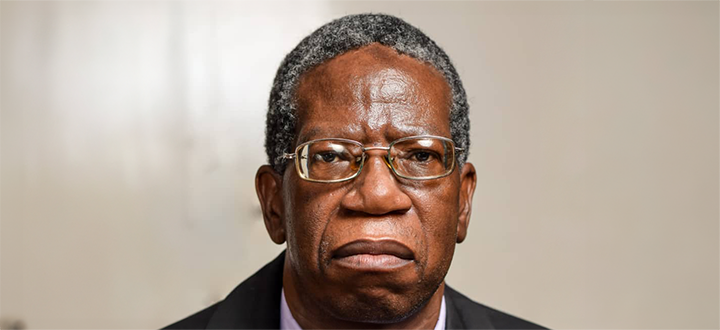Leading change
Join the African table
 Racism in South Africa is white supremacy and it cannot be properly understood without African philosophy. This is the view of Unisa philosophy lecturer, Ndumiso Dladla, who recently launched his book, Here is a table: A philosophical essay on the history of race in South Africa.
Racism in South Africa is white supremacy and it cannot be properly understood without African philosophy. This is the view of Unisa philosophy lecturer, Ndumiso Dladla, who recently launched his book, Here is a table: A philosophical essay on the history of race in South Africa.
Speaking at the launch, the College of Human Sciences lecturer said in South Africa, African philosophy is a minority; it is marginalised, and this is the result of systematic racism. He explains that African philosophy is a philosophy of liberation and a practice of resistance.
“This is a philosophy whose primary concern is doubly the liberation of the oppressed people by whom it is constituted, through their own reflections, and the liberation of philosophy itself in its historical complicity in the oppression of the people.”
He said his book speaks on the liberation that black South Africans need from racism and his reflections are directed against the kind of philosophy that obfuscates rather than elucidates racism, thereby sustaining its oppressive power. Topics explored in the book included, among others, the study of racism in South Africa; the critique of Eurocentrism and Ubuntu; a philosophical appraisal of the history of racism in South Africa; a critique of the analytic conception of race; an African philosophical critique of the liberal conception of non-racialism; and Steve Biko’s Black Consciousness critique of non-racialism.
Dladla said the title and image of his book are important to his research as it draws from Biko’s metaphor of a table and Pan African Congress leader Robert Sobukwe’s metaphor of a tree. Sobukwe’s tree provided the wood for Biko’s table, he said.
The metaphor of the table implies that the object of liberation is not to sit at the table of western philosophers and to be invited into their conversation. “African philosophy in Africa cannot sit at the table of western philosophy. Rather, they must leave the table, and we must rearrange it. Western philosophy is then welcome to sit at our table but the conversation must be on our terms.”
The metaphor of the tree, he continued, is linked to Robert Sobukwe’s ideology of a tree that is grounded in African soil. “In 1959, Sobukwe delivered a speech entitled, Here is a tree, in which he gives the best exposition of his conception of non-racialism. He says that in order for non-Africans to become Africans, they should relinquish title to territory over Africa and accept the sovereignty of the indigenous conquered people. Only once such has taken place and the historical injustice of conquest and dispossession has been resolved can we become one people.”
In line with this, Dladla says white people are not immigrants in South Africa; they are conquerors. “If you arrive as an immigrant you assume the culture of that nation, white people conquered South Africa and asserted European culture as basis of South African culture.”

Additionally, Dladla said, the central contention of the book is that following the problematic “negotiated settlement” of the early nineties, some amongst the indigenous conquered people joined the table, while the rest remained locked outside the house, nowhere near the dining room. “We move from the understanding that Biko’s table is still outstanding and it is the purpose of any liberatory thought both to conceive of it and realise it.”
He continued that the recent political events of the #RhodesMustFall and #FeesMustFall movements may be seen as beginnings of an awakening amongst African people that their table is arranged in someone else’s style and they are being kept away from it.
“The hope of this book is that it may contain some useful small sketches which will help those interested in getting the table back to its rightful owners and decorating it in the appropriate fashion.”
*By Rivonia Naidu-Hoffmeester
Publish date: 2017-03-08 00:00:00.0


 Unisa honours Dr OK Matsepe's enduring legacy
Unisa honours Dr OK Matsepe's enduring legacy
 Great strides towards concretising Unisa-PMC partnership
Great strides towards concretising Unisa-PMC partnership
 Mental health among men in the workplace needs more attention
Mental health among men in the workplace needs more attention
 "I owe everything to Unisa and my late supervisor's priceless mentoring"
"I owe everything to Unisa and my late supervisor's priceless mentoring"
 Majikijela - a queer scholar raising homosexuality awareness through his work
Majikijela - a queer scholar raising homosexuality awareness through his work